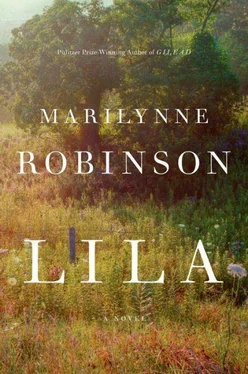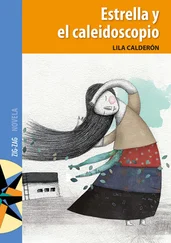She said, “We got to do something with that damn knife.”
He said, “I suppose.” She could tell by his voice he’d been awake for a while, lying still, too. “It’s handy to have around, though. Good for paring apples.”
“You been using my knife to pare apples?” She’d have turned to look him in the eye, except for the heft of her belly.
“Once or twice.”
“I never said you could use it.”
“Sorry. I don’t think I did it any harm. I believe you said you used to use it to clean fish.”
“That’s different.” Why was it different? Because it was the only knife she had. And she never slit a fish without thinking she hated the need to use it that way. Hating the need almost made it seem all right. Besides, it was a kind of a little murder, gutting a fish, so when she did it she thought back over her life, and there was something to that. The knife was a potent thing. Other people had houses and towns and names and graveyards. They had church pews. All she had was that knife. And dread and loneliness and regret. That was her dowry. Other women brought quilts and china. Even a little money sometimes. She brought hard hands and a face she could barely bring herself to look at in a mirror because her life was just written all over it. And that knife.
But thinking about her life was another thing. Lying there in that room in that house in that quiet town she could choose what her life had been. The others were there. The world was there, evening and morning. No matter what anybody thought, no matter if she only tagged after them because they let her. That sweet nowhere. If the world had a soul, that was it. All of them wandering through it, never knowing anything different or wanting anything more.
Well, that wasn’t true, either.
But one time she and Mellie cut across a field, and just beyond it there was a little valley, budding cottonwood trees letting morning light pass right through, new ferns and new grass all bright with it. In a few days it would be the valley of the shadow, but that day there were only traces of shade, the light just blooming, dandelion yellow in all that green. When you see something like that, it doesn’t seem like anything you’ve ever seen before. She and Mellie were whispering. It would be their valley. They’d think of a secret name for it. Soon enough they heard Doane calling for them, and they had to leave it behind, and it felt like a broken promise when they did.
Remembering always felt almost guilty, a lingering where there was no cause to linger, as if whatever you loved had a claim on you and you couldn’t help feeling it no matter what. There was nothing to do but leave, and still. That Mack. There was a time when she would have been so glad if he’d asked her for anything at all. If he had said one word to her, there in the street that day. The old man always pretended he was worried that some fellow would show up at the door. When she told him there was nobody coming for her, Mack was that nobody. She could just see the smile on his face, him standing at the Reverend’s door, his eyes all sly with the evil he was doing. He’d have his hands on his hips, looking around at the neighborhood as if he couldn’t quite believe people really lived that way. Cigarette hanging out of his mouth, laughing to himself. No decent man would look at every single thing in the world as if it had a price tag on it and he knew it wasn’t worth half that much because he could see what the paint hid, where the rot was. He’d flip his cigarette into the bushes and say, So it’s Mrs. Ames now, and laugh. He’d say, Good to see you, Rosie, hardly looking at her, and light up another cigarette and glance away from her like anything else would be more interesting, because nothing had changed at all. She’d probably shut the door on him, and then if he left she’d be thinking about him more than she usually did.
Or he might sit down on the step to finish his smoke, and if the old man happened to come walking up from the church, he’d tell him he was looking for a little work. If he happened to get a lift out of town, people always appreciate a dollar or two to help pay for the gas. The Reverend would nod, he could do something or other around the place, and he would say, Thanks, smiling, and then as soon as the old man had come inside to look for his wallet he would drift away because it was a lie that he wanted work or money. He would have said a few words to the old man just to make her worry about what he might say. He’d have been sitting there smoking, his back to her, making sure she remembered that the two of them were not strangers and never would be, either. That’s just how it is. If she ever saw that child of Missy’s, it would be the child she’d hoped to steal. No matter that it had never seen her face. If she heard it was in trouble, she would say, Come here to me, then. I used to dream I’d have you to comfort. That’s how I kept myself alive for a while one time.
You. What a strange word that is. She thought, I have never laid eyes on you. I am waiting for you. The old man prays for you. He almost can’t believe he has you to pray for. Both of us think about you the whole day long. If I die bearing you, or if you die when you are born, I will still be thinking, Who are you? and there will be only one answer out of all the people in the world, all the people there have ever been or will ever be. If we find each other in heaven, we’ll say, So there you are! We’d be perfect in heaven, no regrets, no grudges, nothing to make you turn a cold eye on me the way you might do someday when you’re old enough to really see me. When I tell you that that knife is the only thing I have to leave you. Then I’d be all hard and proud, like it didn’t even matter what you thought. What else can a person do? And it would be the only thing that mattered, because no one else could say “you” and mean the same thing by it. But there would be years when the child would just want to sit on her lap. He’d favor her over anybody. He’d be crying and she’d pick him up, and then it would take him a minute to be done crying, but that would be all that was left of it, because she had her arms around him. Comfort. That’s strange, too. When she used to lie there almost asleep, with her cheek on the old man’s sweater, the night all around her chirping and whispering, the comfort of it was a thing she’d have promised herself the whole day long.
Thinking that way made her want to turn onto her back, to feel how good it was to be lying there, her body resting at a kind of simmer, the baby nudging a little, just so she’d know it was there. She could feel her body resting, the way you can tell that a cat asleep in the sun knows it’s sleeping. The pleasure of it is just too good to go to waste. When she stirred, the old man sat up out of the covers. “Night!” he said. “Well. I guess the wind has died down. We slept through supper. How are you feeling? Can I get you a sandwich?” He fumbled for his glasses. It always took him a minute to collect himself. That’s what he would say. Let me collect myself. Give me a minute here. Everything seemed strange when she thought about it. Where had he been? Nowhere at all, even lying there beside her. His hair was all pushed to one side, that longer hair that was meant to hide his baldness a little. He looked as though he had waked out of a dream, or into one, that made him feel he had to do something important and couldn’t take the time to figure out what it was.
“You,” she said.
He laughed. “Who else?”
She said, “Nobody else in this world.”
* * *
There was more snow after that one, sugar snow, the old man called it, because his grandfather said that in Maine the last snow fell while the sap was running in the maple trees and they were catching it in buckets and boiling it into syrup. If he had ever visited Maine, it would have been in the spring. His grandfather talked about the wood fires and the sweet fog in the air and fresh syrup poured over fresh snow, the one earthly delight he would confess a craving for. “They ate it with a dill pickle. Afraid to enjoy it too much, I suppose.” He was happier than he wanted her to see, relieved even though he knew it was too soon to trust that they were safe yet, and worried that he was too ready to be happy and relieved. After breakfast he set a little glass bowl on the porch railing to catch some snow as it fell, and when he saw it had stopped falling, he took the bowl out to the rosebushes to pluck snow that had caught in the brambles. He brought it inside and set it on the windowsill so the sun would melt it. It was pretty the way the light made kind of a little flame, floating in the middle of the water, burning away in there cold as could be. It was for christening the child, she knew without asking. If the child came struggling into the world, that water would be ready for him. If it had to be his only blessing, then it would be a pure and lovely blessing. That was the old man getting ready to make the best of the worst that could happen. Not my will but Thine. In his sermons he was always reminding himself of that prayer. She would wake up at night and find him sitting on the edge of the bed in the dark, his head in his hands. Maybe he never really slept.
Читать дальше












